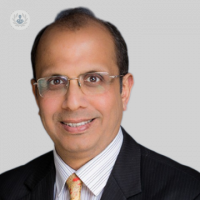All about laparoscopy surgery for gallstones
Written by:Gallstones are stones that form within the gallbladder and are usually made of cholesterol. Here, one of our top surgeons Mr Sanjay Agrawal explains what the signs of gallstones are, if symptoms present then when surgery is necessary and if it is possible to lead a normal life without the gallbladder.

What are the symptoms of gallstones?
In most cases, gallstones do not cause any symptoms and therefore do not need to be treated.
If a gallstone blocks the opening (duct) inside the gallbladder it can cause sudden intense pain in your tummy, which usually lasts between one and six hours (biliary colic). In biliary or symptomatic gallstones, keyhole surgery to remove the gallbladder is recommended.
Sometimes, gallstones can lead to complications, such as inflammation of the gallbladder (cholecystitis). This can cause persistent pain and high temperature.
A gallstone can sometimes slip through the duct and jump up and down in the bile pipe, causing yellowing of the skin and eyes (jaundice) or infection within the bile pipes, which causes cholelithiasis.
Very rarely, gallstones can cause inflammation in the pancreas (acute gallstone pancreatitis).
When is surgery necessary for gallstones?
In asymptomatic gallstones, they do not need to be treated.
In biliary or symptomatic gallstones, keyhole surgery to remove the gallbladder is recommended.
The surgical procedure is known as laparoscopic cholecystectomy, which is a fairly common and routine operation with low risk of complications.
What are the risks of gallbladder surgery?
Laparoscopic cholecystectomy is generally done through 3-4 small incisions whilst the patient is under general anaesthetic.
As with any surgical procedure, there are risks associated with it. These may include:
- Bleeding
- Wound infection
- Bile pipe leak
- Bile pipe injury
- Bowel injury
- Transient right shoulder pain
There may also be general anaesthetic risks like clotting in the legs or lungs, and cardiorespiratory risks, such as chest infection or heart attack.
Sometimes, it can be necessary to perform a procedure known as laparotomy (open cholecystectomy), which may occur in 1 in 20 operations. This is a major surgical procedure, which involves a bigger abdominal incision and requires a longer stay in hospital.
Is it possible to live without the gallbladder?
It is possible to lead a normal life without the gallbladder. Your liver will still produce the bile to digest food but the bile will drip continuously into the small intestine rather than getting stored up in the gallbladder.
Mr Agrawal is a leading surgeon who specialises in weight loss, gallstones and hernia surgery. You can make an appointment with Mr Agrawal via his Top Doctor’s profile here.


